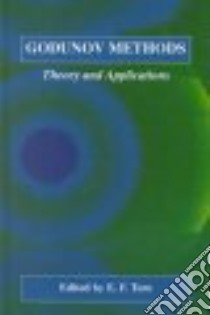Godunov Methods - 9780306466014
Un libro in lingua di Toro E. F. (EDT) International Conference on Godunov Methods (1999 Oxford England) edito da Springer Verlag, 2002
- € 315.80
- Il prezzo è variabile in funzione del cambio della valuta d’origine
This edited review book on Godunov methods contains 97 articles, all of which were presented at the international conference on Godunov Methods: Theory and Applications, held at Oxford, in October 1999, to commemorate the 70th birthday of the Russian mathematician Sergei K. Godunov. The central theme of this book is numerical methods for hyperbolic conservation laws following Godunov's key ideas contained in his celebrated paper of 1959. Hyperbolic conservation laws play a central role in mathematical modelling in several distinct disciplines of science and technology. Application areas include compressible, single (and multiple) fluid dynamics, shock waves, meteorology, elasticity, magnetohydrodynamics, relativity, and many others. The successes in the design and application of new and improved numerical methods of the Godunov type for hyperbolic conservation laws in the last twenty years have made a dramatic impact in these application areas. The 97 papers cover a very wide range of topics, such as design and analysis of numerical schemes, applications to compressible and incompressible fluid dynamics, multi-phase flows, combustion problems, astrophysics, environmental fluid dynamics, and detonation waves. This book will be a reference book on the subject of numerical methods for hyperbolic partial differential equations for many years to come. All contributions are self-contained but do contain a review element. There is a key paper by Peter Sweby in which a general overview of Godunov methods is given. This contribution is particularly suitable for beginners on the subject. This book is unique: it contains virtually everything concerned with Godunov-type methods for conservation laws. As such it will be of particular interest to academics (applied mathematicians, numerical analysts, engineers, environmental scientists, physicists, and astrophysicists) involved in research on numerical methods for partial differential equations; scientists and engineers concerned with new numerical methods and applications to scientific and engineering problems e.g., mechanical engineers, aeronautical engineers, meteorologists; and academics involved in teaching numerical methods for partial differential equations at the postgraduate
Informazioni bibliografiche
- Titolo del Libro in lingua: Godunov Methods
- Sottotitolo: Theory and Applications
- Lingua: English
- Autori : Toro E. F. (EDT) International Conference on Godunov Methods (1999 Oxford England)
- Editore: Springer Verlag
- Collana: Springer Verlag (Hardcover)
- Data di Pubblicazione: 01 Gennaio '02
- Genere: MATHEMATICS
- Argomenti : Fluid dynamics Congresses Conservation laws (Mathematics) Congresses Differential equations, Hyperbolic Numerical solutions Congresses
- Pagine: 1077
- Dimensioni mm: 260 x 177 x 63
- ISBN-10: 0306466015
- EAN-13: 9780306466014


